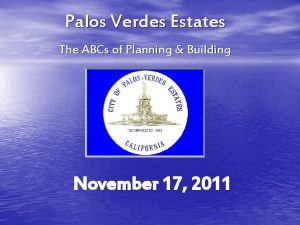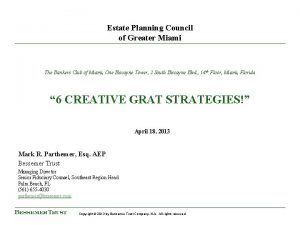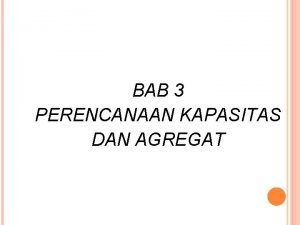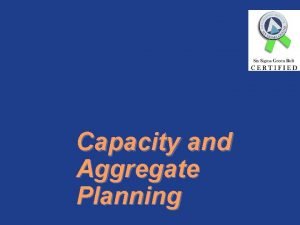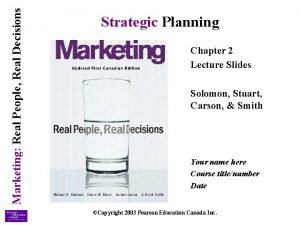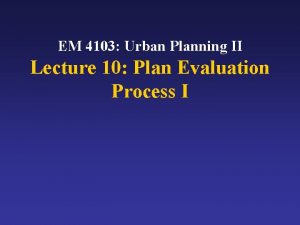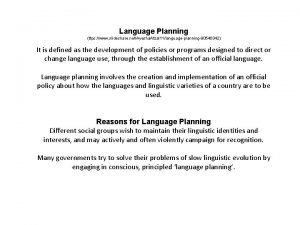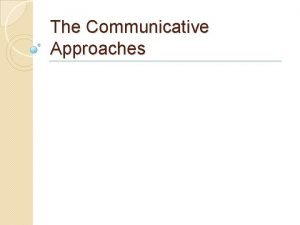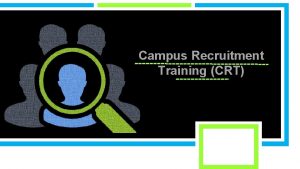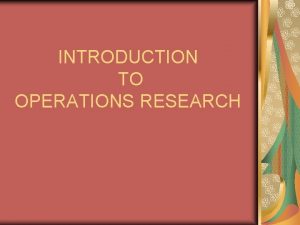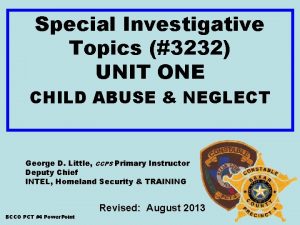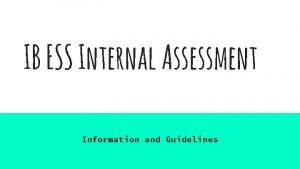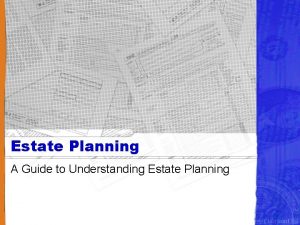Estate Planning Topics What is estate planning Who

































- Slides: 33


Estate Planning Topics • What is estate planning? • Who should have an estate plan? • What legal documents make up a basic estate plan? • What is estate administration and probate? • What type of taxes are involved in estate planning?

What is Estate Planning? It’s mapping out how you want your personal and financial affairs to be handled in case of incapacity or death and creating legal documents necessary to do so.

What are Special Circumstances? Special circumstances do not necessarily mean a disability or handicap. They encompass any circumstance that requires additional planning and provisions.


What Does an Estate Plan Do? An estate plan allows you to control what happens to your property if you die or become incapacitated.

Is There Anyone Who Should Not Have an Estate Plan? No. You need an estate plan regardless of situation and net worth.


What Does an Estate Plan Include? Every estate plan should address the disposition of your assets, as well as the management of your medical care if you become incapacitated.

What is a Last Will and Testament? It is a legal document in which you direct how your property will be dispersed after you die.

Advantages Disadvantages Avoids property passing to Probate fees can be expensive people you do not wish to benefit depending on the state in which you reside Avoids disputes over intended beneficiaries Court-mandated oversight of administration of your estate may increase legal fees Implements tax advantages Time delay in transferring assets to beneficiaries Clarifies rights and duties of personal representatives and trustees

What is a Trust? An arrangement that allows a third party (trustee) to hold and manage assets on behalf of beneficiaries.

Grantor Trustee Beneficiaries Establishes the trust Administers the trust per its terms Decides what property will be included Makes investment decisions and beneficiary distributions The people or entities who derive the benefits of the trust Determines the beneficiaries and when distributions will be made Receive distributions of income or principal

Advantages Disadvantages Beneficiaries can gain access to assets more easily than if transferred through a will Terminating or changing trustees can be difficult Control when and how distributions can be made Fees to set up a trust are typically greater than for a will Protects assets from creditors, divorces and spendthrifts Ongoing trust administration and expenses An inter vivos trust avoids the probate process Failure to re-title assets into a trust may result in having to open a probate estate

Type of Trust Use Marital “A” trust Provides benefits to surviving spouse with balance to be distributed to beneficiaries upon spouse’s death Credit shelter “B” trust Bypasses surviving spouse’s estate in order to use the full federal estate tax exemption and retain use of assets for surviving spouse Children’s trust Provides management and protection of assets where minor or adult children are beneficiaries Special needs trust Designed to protect government benefits while still permitting a disabled beneficiary to benefit from trust funds

What is a Power of Attorney? A power of attorney allows you to name someone to make financial or medical decisions on your behalf.

Factors to Consider • When will it be effective? • Who should you select as agent(s)? • Powers to give agent?

What is an Advanced Health Care Directive/Living Will? A power of attorney for the management of health or medical care.

Feature Effect Appointment of health care agent • Agent makes medical decisions when you are unable to do so for yourself • Permits health care provider to give medical information to your agent End-of-life health treatment instructions (living will) • Written instructions for your agent and medical team to follow if you cannot communicate • Permits your agent to request a do not resuscitate (DNR) order • Avoids patient receiving unwanted treatment

What are Beneficiary. Designated Assets? Beneficiary-designated assets permit you to name the person or organization that you want to receive those assets upon your death.

Advantages Disadvantages Effective division of assets: Maintaining designations: Can have multiple people or entities, including trusts, as beneficiaries Failure to maintain designations can cause transfers to “unwanted” persons Cost and time efficient: Balancing accounts: Assets pass outside of probate Use of assets in one account versus another can disturb the “balance” of assets for each beneficiary


What is Estate Administration? The process by which a person gains control over your assets in order to pay your debts and properly distribute property.

Wills and The Probate Process Generally, a will needs to be probated (filed) with the court in order for the estate to gain control over the assets.

Can Probate be Avoided? Yes, probate can be avoided with proper advanced planning.

Probate Property Non-Probate Property Assets in your name alone Jointly owned property No named beneficiary Beneficiary-designated property • Life insurance • IRAs Assets will pass per the terms of your will or the laws of your state if you do not have a will Trust-owned property

Estate All property subject to tax Probate Property Last Will & Testament Property Distribution Laws In State of Residence Non-Probate Property - Jointly Owned - Beneficiary Designated - Revocable Trust Property

What happens if you die without a will? All non-probate property passes to your beneficiaries. All probate property will pass according to your state’s laws.

Estate Property in Your Name Alone If you have no will, trust, or beneficiary designations it passes pursuant to the laws of the state in which you died. Surviving Spouse’s Share: 1/3 Child 1’s Share: 1/3 Child 2’s Share: 1/3 Beneficiary. Designated Property Owned by You Named Beneficiaries


Tax Type When Applicable Tax Rate Federal Gift Tax Applies to gifts made during your lifetime above the annual exclusion amount ($15, 000 person in 2020) and not covered by one of the other limited exclusions 40% on amounts in excess of $11. 58 million, including all prior taxable gifts Federal Estate Tax Applies to assets transferred at time of death for estates above $11. 58 million, including lifetime taxable gifts 40% on amounts in excess of $11. 58 million Generation Skipping Tax (GST) Applies to transfers made to those more than one generation below you 40% on amounts in excess of $11. 58 million State, Estate and Inheritance Tax Applies to those inheriting from your estate Generally applies to all estates Rates, exemptions, and deductions vary from state to state Tax is in addition to gift and estate taxes

Are there ways to avoid or minimize federal estate and gift taxes? Yes, by carefully mapping an estate plan you can save your beneficiaries money that would have otherwise been lost to transfer taxes.

Federated Hermes, Inc. does not provide investment, tax, or legal advice. The information presented here is not specific to any individual's personal circumstances. To the extent that this material concerns tax matters, it is not intended or written to be used, and cannot be used, by a taxpayer for the purpose of avoiding penalties that may be imposed by law. Each taxpayer should seek independent advice from a tax professional based on his or her individual circumstances. These materials are provided for general information and educational purposes based upon publicly available information from sources believed to be reliable—we cannot assure the accuracy or completeness of these materials. The information in these materials may change at any time and without notice. Federated Securities Corp. G 37943 -01 (4/20) © 2020 Federated Hermes, Inc.
 Chicago estate planning council
Chicago estate planning council Estate planning council of birmingham
Estate planning council of birmingham Strategic planning real estate
Strategic planning real estate Omaha estate planning council
Omaha estate planning council Transamerica estate planning foreign nationals
Transamerica estate planning foreign nationals Keogh plan definition
Keogh plan definition Estate planning palos verdes peninsula
Estate planning palos verdes peninsula Estate planning council of greater miami
Estate planning council of greater miami Family limited partnership
Family limited partnership Northcarolinastateemployeescreditunion
Northcarolinastateemployeescreditunion Ministry estate planning
Ministry estate planning Grat trust
Grat trust Proactive planning and reactive planning
Proactive planning and reactive planning Scenario planning workforce planning
Scenario planning workforce planning Aggregate capacity planning
Aggregate capacity planning Perencanaan kapasitas dan agregat
Perencanaan kapasitas dan agregat Aggregate planning is capacity planning for
Aggregate planning is capacity planning for Strategic planning vs tactical planning
Strategic planning vs tactical planning Short, medium and long term planning in education
Short, medium and long term planning in education Goal achievement matrix
Goal achievement matrix What is language planning
What is language planning Creative welcome for sabbath school
Creative welcome for sabbath school Grammatical competence
Grammatical competence Clil topics
Clil topics Safety moment presentation
Safety moment presentation Crt aptitude topics
Crt aptitude topics Scope of operation research
Scope of operation research Special investigative topics 3232
Special investigative topics 3232 What type of technical drawing is presented
What type of technical drawing is presented Yg dimaksud pemimpin perawatan adalah
Yg dimaksud pemimpin perawatan adalah Work in pairs.answer the questions
Work in pairs.answer the questions Ess ia topics 2020
Ess ia topics 2020 Tourism grade 12 topics
Tourism grade 12 topics Introduction body conclusion example
Introduction body conclusion example






